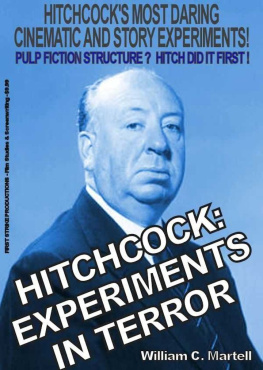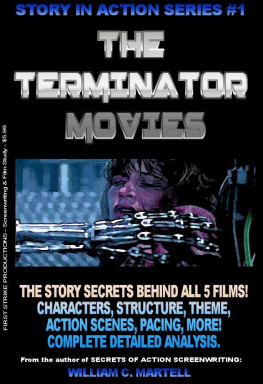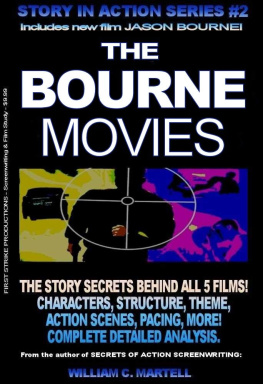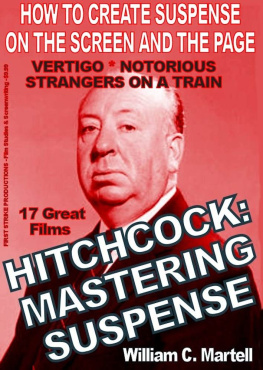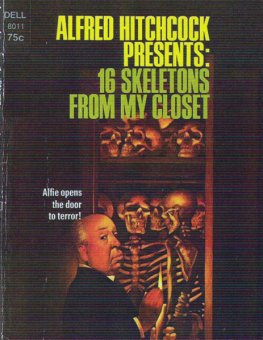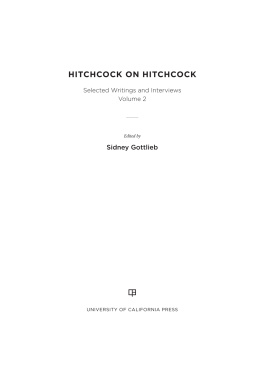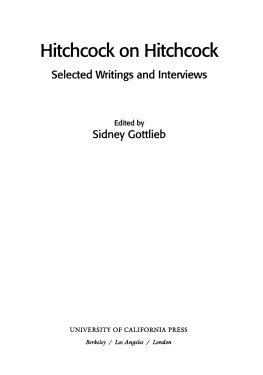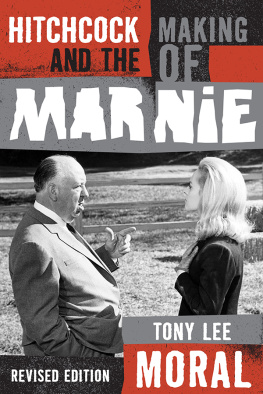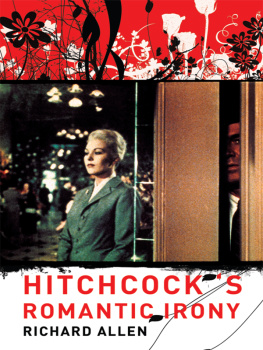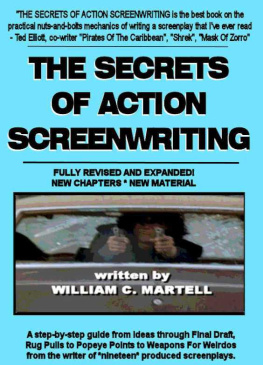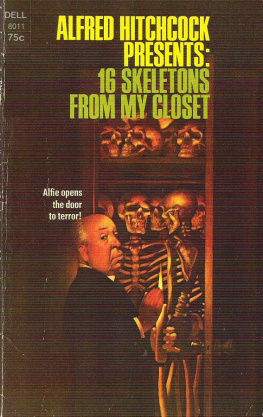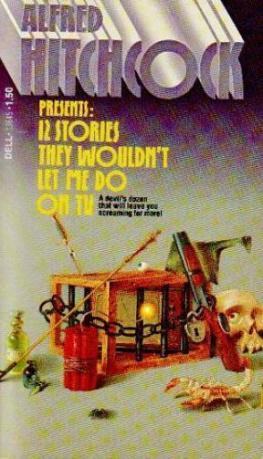William C. Martell - Hitchcock: Experiments In Terror
Here you can read online William C. Martell - Hitchcock: Experiments In Terror full text of the book (entire story) in english for free. Download pdf and epub, get meaning, cover and reviews about this ebook. year: 2013, publisher: First Strike Productions, genre: Detective and thriller. Description of the work, (preface) as well as reviews are available. Best literature library LitArk.com created for fans of good reading and offers a wide selection of genres:
Romance novel
Science fiction
Adventure
Detective
Science
History
Home and family
Prose
Art
Politics
Computer
Non-fiction
Religion
Business
Children
Humor
Choose a favorite category and find really read worthwhile books. Enjoy immersion in the world of imagination, feel the emotions of the characters or learn something new for yourself, make an fascinating discovery.
- Book:Hitchcock: Experiments In Terror
- Author:
- Publisher:First Strike Productions
- Genre:
- Year:2013
- Rating:3 / 5
- Favourites:Add to favourites
- Your mark:
- 60
- 1
- 2
- 3
- 4
- 5
Hitchcock: Experiments In Terror: summary, description and annotation
We offer to read an annotation, description, summary or preface (depends on what the author of the book "Hitchcock: Experiments In Terror" wrote himself). If you haven't found the necessary information about the book — write in the comments, we will try to find it.
Hitchcock: Experiments In Terror — read online for free the complete book (whole text) full work
Below is the text of the book, divided by pages. System saving the place of the last page read, allows you to conveniently read the book "Hitchcock: Experiments In Terror" online for free, without having to search again every time where you left off. Put a bookmark, and you can go to the page where you finished reading at any time.
Font size:
Interval:
Bookmark:
by
William C. Martell
FIRST STRIKE PRODUCTIONS
Hitchcock: Experiments In Terror
First Edition
ISBN:
Copyright 2013 by William C. Martell
All rights reserved. No part of this book may be reproduced or transmitted in any form or by any means, electronic, mechanical, or telepathic, including photocopying, recording, or any information and retrieval system, without the prior written permission of the Writer, except by a reviewer who may quote brief passages in a review.
First Strike Productions
11012 Ventura Blvd #103
Studio City, CA 91604
http://www.ScriptSecrets.Net
The Language Of Film
Restricted Point Of View
Kuleshov Effect
Ambient Score
Serial Protagonists
Out With The Old Protagonist
Non Voice Over Voice Over
Non Star Cast
Intersecting Stories
Extreme POV Chase
Double Entendres
Puzzle Set Piece
Pulp Fiction Plotting
Multiple Stories
Stock Footage
Single Take
Shots
Human Wipes
Scenes?
Poking The Tiger
No Camera Move Suspense
Chess Match
Documentary Experiment
Emotions Under Realism
Religious Experiment
Stage Play To Silent Film
Visual Transformation
Contained Thrillers
Dog Juice
More Personal Conflict
Symbolism
Endings
Same Story Twice
Repertory Cast
Television!
3D Experiment
Unlikeable Lead
Suspense Triggers
Killer Twists
Focused Suspense
One Shot Jury
Flashback That Lies
See Me Think!
Identity Confusion
Not My Problem
Hero/Villain Confusion
Leitmotif
Visual Experiments
Gags
Psychiatry Experiment
Extreme Point Of View
Dali Dream Sequence
Method Actors
Location Shooting
Confessions
Character To Character Flow
Reversals
One Woman Jury
Oddball Characters
Color Cinematography
The Love Corpse
Double Entendre Dialogue
Upside Down Suspense
Wonderful World Of Irony
Secret Suspense
Other Film Experiments
POST SCRIPT
- EXPERIMENTS IN TERROR
When you think of Alfred Hitchcock, what comes to mind? Killer birds pecking out your eyes? Men in drag with glittering knives? Crop dusters where there are no crops? Or maybe the host and producer of that cool vintage TV show where most of the episodes had great twist endings and he would open every show with Good evening and then make fun of his sponsors (decades before Letterman made fun of his network)? Or maybe you think of him as some old school director who was part of that studio system that crashed and burned in 1969 when the edgy indie filmmakers like Robert Altman (2 episodes of Hitchcock Presents) and method actors like Steve McQueen became stars (2 episodes of Hitchcock Presents) took over and the idea of some stodgy guy who did storyboards for every shot and believed the film was made before anyone set foot on the set was too old fashioned for todays world?
I mean - can you imagine Hitchcock making something as innovative as A Place Beyond The Pines with its serial protagonists? Or some movie with a structure like Pulp Fiction? Or even a stunt contained thriller like Buried or Brake where the whole movie takes place in *only* one very small location? Let alone make a movie thats one continuous take like Russian Ark! No way hed do something like Memento that moved backwards through time - starting at the beginning and moving to the end! How about a story like Run, Lola, Run where the same story is told more than once with a different outcome each time? And you cant imagine him doing some sort of LSD influenced dream sequence thing! This is some old school fuddy duddy who was making films before anyone thought of doing wild experimental stuff like that!
Well, the fact is, Hitchcock was the first one to do all of those things. A trail blazer who was constantly pushing the boundaries of cinema with his crazy experiments. He was a trail blazer both with technical experiments like trying to shoot an entire film in one continuous shot (Rope) and story experiments where he screwed with the basics of stories and tried to break all of the Three Greek Unities and any other rules people may have come up with in the 2,400 years since - as in the Pulp Fictionesque Topaz - which has four interconnected short stories.
Hitchcock was a master of cinema - one of the few directors who really understood how cinema works. He knew that every angle, every camera movement, every composition of the frame, and every juxtaposition of shots and images created an *emotional response* in the audience. Though he didnt create the Kuleshov Effect, he understood how it worked - that simply editing two pieces of film together could create a performance in an actor. Wilson the Volleyball could give a heartbreaking performance in a film! As an experiment - he used this technique to create Jimmy Stewarts performance in Rear Window. In the original version of the Hitchcock/Truffaut book they had the actual stills from the sequence... and Jimmy Stewart had the exact same expression on his face in every shot! For the reprint, some idiot didnt understand what the images were demonstrating, and only used *one* still of Stewart to save space. That ends up the problem with many directors today - they just do not understand the language of cinema. Hitchcock not only understood the language of cinema, he played with it... doing things that no director had ever done before.
The Language Of Cinema: A successful cinema experiment requires that you understand how cinema works in the first place, and many experimental films today end up being failed experiments. Hitchcock really understood the language of cinema and that is why we know his name today, and why he was able to do ground breaking experiments when others are not on solid ground in the first place. Before you can push the boundaries of cinema, you have to know where those boundaries *are*. Just making a feature film in one continuous shot is meaningless unless that shot is doing what the thousands of shots it is replacing would have done to visually tell the story. Many directors today do not understand that cinematic language, and end up kind of like me on vacation in Mexico with my two years of High School Spanish... fumbling around, trying to make sense as I order two Cokes to go.
There are directors who shoot a warehouse full of random shots and hand these over to the editor to make sense of. This is what I call the Television Method, because TV sitcoms are often shot live with multiple cameras and then created in the editing room. Though producers often like directors who use this method because they get lots of coverage, all of those shots are *not* designed to tell the story. Its the same as prattling on and on in conversation in hopes that the listener figures out what it is you are trying to say. Having three or four or even ten angles of something doesnt matter if none of them are the *right* angle.
Hitchcock understood cinema to the point that he seldom shot anything that was not used in the final cut. No chaff, just grain. He was brought to American by producer David O. Selznick, who was so insanely hands on that a book of his detailed memos was published in the 1970s which is both funny and frightening to read. The original micro manager. Hitchcock angered Selznick, because he delivered *only* the shots required to make the movie, and nothing extra that the producer could fool around with in the editing room to recut the film. There was nothing left over!
Font size:
Interval:
Bookmark:
Similar books «Hitchcock: Experiments In Terror»
Look at similar books to Hitchcock: Experiments In Terror. We have selected literature similar in name and meaning in the hope of providing readers with more options to find new, interesting, not yet read works.
Discussion, reviews of the book Hitchcock: Experiments In Terror and just readers' own opinions. Leave your comments, write what you think about the work, its meaning or the main characters. Specify what exactly you liked and what you didn't like, and why you think so.

